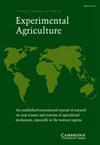Factors influencing the variation in canopy light extinction coefficient (k) among pisifera parents of two oil palm origins
IF 1.9
4区 农林科学
Q1 Agricultural and Biological Sciences
引用次数: 0
Abstract
Summary The canopy light extinction coefficient (影响两个油棕原产地的 pisifera 亲本树冠光消光系数 (k) 变化的因素
摘要 树冠光消光系数(k)的定义是,穿过叶层的光量随叶面积指数(LAI)呈指数下降。这一定义是油棕育种试验和冠层光合作用模型的标准,有时假定 k 为固定值。本实验旨在验证 k 的所谓恒定性。因此,k 是根据尼日利亚和加纳 pisifera 的 dura x pisifera 试验杂交获得的光合有效辐射(PAR)和 LAI 的部分传输推断出来的。这些棕榈树于 2010 年在北苏门答腊以两种密度(135 和 160 株/公顷)种植。在种植后 7.5 年,新开叶片的面积接近最大值。与此相反,LAI 对 k 有很大的负面影响,在两种密度下,两个原产地之间以及同一原产地内不同 pisifera 之间的 k 都有很大差异。因此,假设在闭合冠层下叶片膨大过程中获得的某一基因型或棕榈密度的 k 值是固定的,可能并不现实。本研究表明,随着时间的推移,k 与 LAI 的关系值得进一步研究,研究应在树冠闭合前开始。
本文章由计算机程序翻译,如有差异,请以英文原文为准。
求助全文
约1分钟内获得全文
求助全文
来源期刊

Experimental Agriculture
农林科学-农艺学
CiteScore
2.50
自引率
6.20%
发文量
29
审稿时长
24 months
期刊介绍:
With a focus on the tropical and sub-tropical regions of the world, Experimental Agriculture publishes the results of original research on field, plantation and herbage crops grown for food or feed, or for industrial purposes, and on farming systems, including livestock and people. It reports experimental work designed to explain how crops respond to the environment in biological and physical terms, and on the social and economic issues that may influence the uptake of the results of research by policy makers and farmers, including the role of institutions and partnerships in delivering impact. The journal also publishes accounts and critical discussions of new quantitative and qualitative methods in agricultural and ecosystems research, and of contemporary issues arising in countries where agricultural production needs to develop rapidly. There is a regular book review section and occasional, often invited, reviews of research.
 求助内容:
求助内容: 应助结果提醒方式:
应助结果提醒方式:


